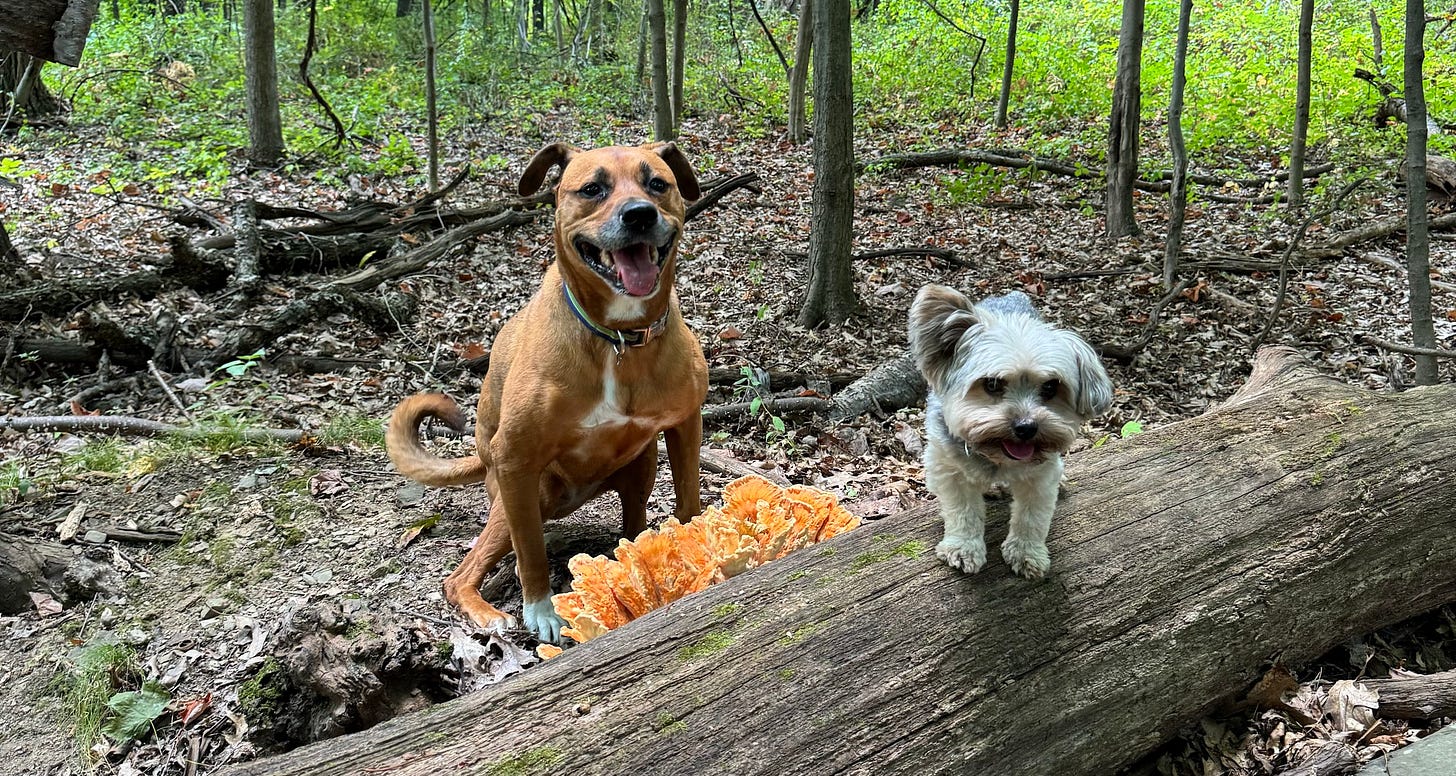Into the Woods
On losing, looking, and finding
Grief drove me into the woods. I’d been walking the dogs on country roads in the mornings, but after losing both parents in the space of fourteen months, I found my way to some nearby forest trails.
Emma, always the most thoughtful gift-giver, had given me for this post-parental loss birthday: a rotating antique hourglass, a framed line-drawing print of a skull, and a book called Japanese Death Poems.
“I’m sensing a theme,” I said.
In the following weeks, I’d be working at my desk, and Emma would stop by and flip the hourglass, the black sand now slipping away. In a mere five minutes, the top half would be drained.
“Are you trying to tell me something?” I asked her. I’d been avoiding the hourglass, already feeling like everything, everything was slipping away from me.
“No, I just love seeing the sand flow,” she said, and kissed the top of my head.
In those early days, I wandered the woods, mostly lost in thought. What was I to make of my mom’s life, or my dad’s? What did any of it mean? I felt unmoored.
One morning, I set the dogs up with bully sticks and climbed the fire tower, which looks out onto the entire valley, the Hudson River snaking through the distant haze. The tower creaked and swayed in the wind as I looked out over the singular canopy of treetops, an undulating green sea below.
I looked out to the western horizon, thinking of the Pacific Ocean on the other side of the continent. I remembered racing my mom across the beach. She was giggling, both of us running fast over the hot sand. At that same beach, my dad and I once got caught in big surf on his catamaran, flipping it and snapping the mast. All of that was out there, somewhere.
I clambered back down, careful on the hundred or so steep metal steps, until I was once again beneath the dense canopy.
The dogs and I hustled on the downhill trails. I was mostly blind to the nature around me, other than calling the dogs away from a chipmunk. Leave it, I told them.
As these forest hikes became a daily ritual, I started to see and hear more. A new fallen oak tree. A bird call that sounds like when Pacman dies. Over the weeks, I began to notice, everywhere: mushrooms.
First, radiant clusters of golden oyster mushrooms. How had I walked right past them before, when they look like this?
A good friend and I began hiking together most mornings. I soon learned that his wife had a cancer diagnosis, with a long year of treatment ahead, including radiation and chemo (she’s in remission now, thank heavens). We walked together that year, wondering aloud about difficult things, telling stories, sometimes just cracking each other up. Other times we went for long stretches in silence, just us and the dogs moving over the trails.
Over the months, and then the seasons, we became foragers together, learning dozens of species of gourmet and medicinal mushrooms, discussing how to cook and store them, how to identify lookalikes.
We learned to identify deadly mushrooms unfailingly: Destroying angel. Death cap. Funeral bell.1
For Father’s Day, Emma surprised me with a leather foraging satchel. It has a shoulder strap and rides on the hip. It’s basically a foraging purse. My teen daughter saw me trying it on, and, after confirming that I would actually be wearing it outside of the house, said, “Well, at least you’re confident in your masculinity.”
In all this time, I hadn’t yet cracked the book of Japanese death poems. I’d been too raw. These mushrooms, though, seemed to me like little death poems of their own. Compact, beautiful, nourishing things, springing from death.
After each hike, my friend and I divide up the morning’s haul on the hood of his car: maitake, golden oysters, chicken of the woods, puffballs, shrimp of the woods, reishi. The next day: honey mushrooms, lion’s mane, pheasant back. These are fall mushrooms. In spring and summer: morels and chanterelles.
Wandering among all this old growth, new growth, decay, rebirth, noticing the trees, birds, seasons, everything in motion, I can feel what the biologist Merlin Sheldrake says in Entangled Life:
“All life-forms are in fact processes not things.”
Everything is both fleeting and inseparable. The woods remind me of this, all the time. Here’s life, death, the cycling seasons, the whole of it in continuous, interdependent flux: grief, joy, loss, love, friendship, father, mother, son, all of it. It’s hard to miss, once you look.
In time, I started turning the hourglass every so often, just to watch the sand flow. I began reading the Japanese death poems, too, lingering over them.
Two favorites:
The snow of yesterday
That fell like cherry petals
Is water once again
- Gozan
A journey of no return
A wanderer’s sack
Is bottomless
- Kyoshu
Foraging is immensely rewarding, but mistakes with mushrooms can be deadly. Please don’t ever eat any mushroom you’re not 100% sure of. Learn from experts, and proceed slowly, with great caution.





I am always nourished by the life stories that you share Rob and the hourglass jumped out in my attention. I can see you flipping it over like a magic talisman every time you sit down to tell another story, the flow of the sand invoking the soft, gentle flow of your words—which is how your stories feel to me—reliable, steady, elemental, and sure.
Rob. This is beautiful.